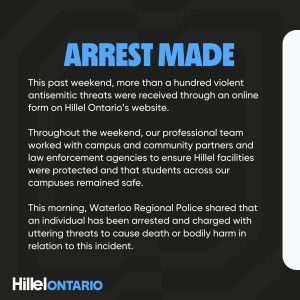 TORONTO — There are 613 mitzvot in the Torah that Jews should strive to observe, but there is one in particular that overrides any other obligation, said Rabbi Yisrael Meir Lau.
TORONTO — There are 613 mitzvot in the Torah that Jews should strive to observe, but there is one in particular that overrides any other obligation, said Rabbi Yisrael Meir Lau.
Chief Rabbi Yisrael Meir Lau speaks about his support of the Ezer Mizion Jewish bone marrow registry at a benefit dinner. [Photo courtesy of Central Image Agency]
“What is the greatest commandment? Yom Kippur? Shabbat? Kashrut? Of the 613 commandments, all of these commandments are on the second line if they are in competition with another law, the holiness of life, what we call pikuach nefesh,” said Rabbi Lau, the former Ashkenazi chief rabbi of Israel and current chief rabbi of Tel Aviv who was in Toronto earlier this month as guest of honour at a benefit dinner for the Ezer Mizion Bone Marrow Registry, held at the Windsor Arms Hotel.
Ezer Mizion, which Rabbi Lau described as a “magnificent” organization, is an Israeli non-profit group that saves lives and offers medical and social support services to help ailing, disabled, elderly and underprivileged Israelis.
Its bone marrow donor registry, which is the largest Jewish registry in the world, was founded in 1998. Ten years later, it boasts a list of almost 400,000 potential donors.
At the dinner, Rabbi Lau, who last week was appointed chair of the council of the Yad Vashem Holocaust Martyrs’ and Heroes’ Remembrance Authority – an honorary body of 120 people that meets once a year – spoke about the importance of the organization that saves lives and the mitzvah of pikuach nefesh.
“Shabbat, Yom Kippur, Pesach, if they come in conflict with the question of survival, if they are in a clash with the desire of living, of existence – the Torah says, these are laws, commandments that a being has to observe and live accordingly. To live, not to die,” said Rabbi Lau, the youngest survivor of the Buchenwald concentration camp.
Rabbi Lau immigrated to Israel when he was eight with his older brother after the war. His uncle and half brother were the only other family members who survived the Holocaust.
He received his rabbinical ordination in 1971 and was later chief rabbi of Netanya and chief Ashkenazi rabbi of Tel Aviv before serving as chief Ashkenazi rabbi of Israel from 1993 to 2003.
In 2005, he was re-elected chief rabbi of Tel Aviv, and in that year, he received the Israel Prize Lifetime Achievement award for “bridging rifts in Israeli society.”
At the dinner, Rabbi Lau reiterated the fact that preserving life is the holiest commandment in the Torah.
“Not only that you should not take his life, not only that you should help him to exist, but you are forbidden to stay on the sidelines and not to do everything possible to save a human being’s life, whoever it may be – a Jew or an Arab, a Christian or a Muslim.”
Speaking in advance of the dinner, Ofra Konikoff, the Ezer Mizion registry’s transplant co-ordinator, said raising money for the registry is important because it serves Jews around the world, since donors and recipients need to be genetically compatible.
“Once you enlarge the registry, you enlarge the chances of finding a match,” Konikoff said.
“Daily, we get files of patients from all over the world who are looking for matches and if we find a match we recruit the stem cells from the bone marrow, and it goes to the patient wherever they are being hospitalized.”
Konikoff said that when the registry was founded 10 years ago, it only had 5,000 samples.
Having surpassed the halfway point toward the goal of reaching 700,000 samples, she said she is very proud, but the registry still has a long way to go.
In 2005, in an effort to speed up the process of reaching that goal, Ezer Mizion partnered with the Israeli Defence Forces to recruit blood samples from soldiers on their very first day in the army, Konikoff said.
“They are invited to the clinic to come and give us a blood sample, and the blood samples are being tissue typed and the results are being put in our data.”
She said that Rabbi Lau has always been a vocal supporter of the registry and always helps to promote it when he has the time.
“He is a great supporter of this project, because he knows that it saves Jewish lives, and he thinks that saving a life is the biggest mitzvah.”
For more information, visit www.ezermizion.org.






